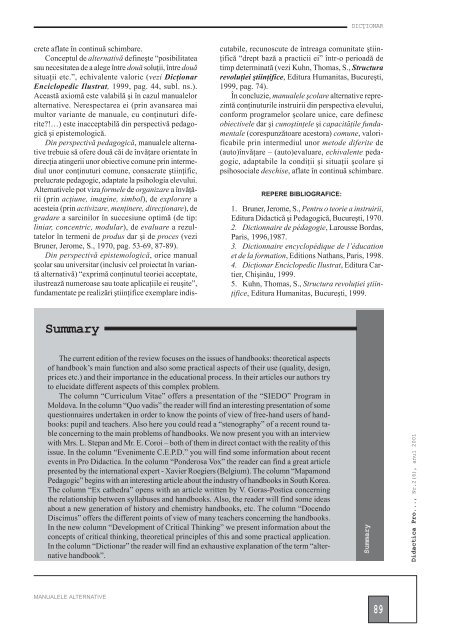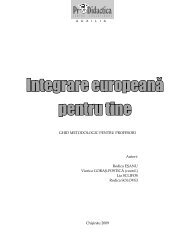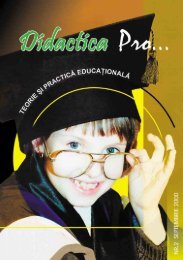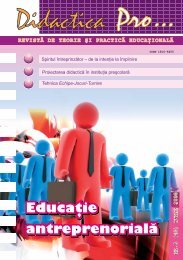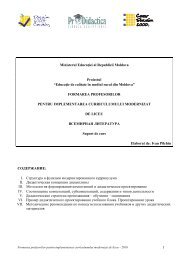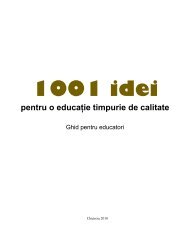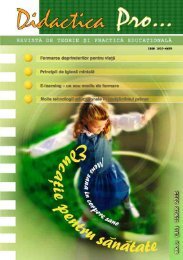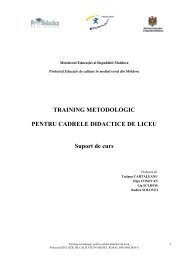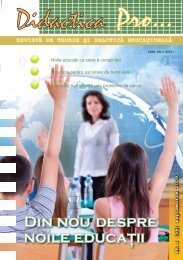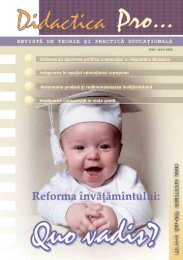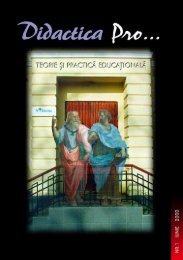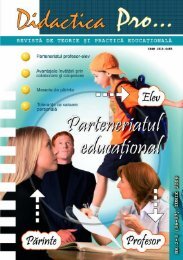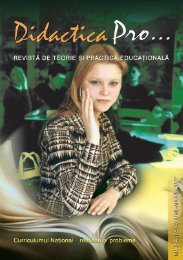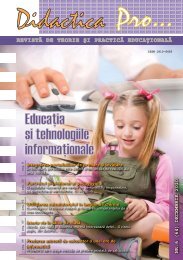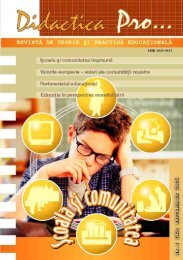DICÞIONARale disciplinei respective ºi a conþinuturilor fundamentalecorespunzãtoare acestora, aflate în concordanþãcu idealul educaþiei propriu modelului culturalal societãþii informatizate (vezi idealul personalitãþiiautonome ºi creative); b) evidenþierea corelaþiiloroptime dintre cunoºtinþe ºi capacitãþi, dintre informaþiileºtiinþifice selecþionate ºi efectele psihologiceangajate pe termen scurt, mediu, lung; c) sugerarea soluþiilorstrategice posibile, în termeni de operaþionalizarea obiectivelor ºi de adoptare a unor metode depredare-învãþare-evaluare eficiente, realizabile în contextepedagogice diferite (clase/elevi cu niveluriºcolare, sociale, psihologice diferite într-un anumitmoment al evoluþiei lor). Asemenea programe ºcolareasigurã autorilor de manuale ºcolare premisele necesarepentru structurarea, esenþializarea ºi concretizareacorectã (logicã ºi pedagogicã) a conþinuturilor instruiriipe fondul valorificãrii depline a potenþialuluipsihosocial propriu fiecãrei vîrste ºcolare ºi psihologice.<strong>Pro</strong>movarea manualelor alternative rãspundeunui proces mai larg de dezvoltare a acestui “produseditorial” care se adapteazã la o multitudine deevoluþii: a) pedagogice (restructurarea concepþiilordidactice – vezi paradigma curriculumului); b) metodologice(reorganizarea discursului didactic pesecvenþe programate – liniar, concentric, modular –inclusiv în limbaj informaþional); c) sociale (expansiuneacererilor ºi a ofertelor, pe fondul democratizãriieducaþiei în sensul valorilor educaþiei permanenteºi ale autoeducaþiei). Ca “instrument de învãþare”,rezervat iniþial exclusiv elevului, manualulºcolar devine din ce în ce mai complex, valorificîndnumeroase suporturi (tipografice/fiºe, scheme grafice,imagini colorate; audiovizuale/televiziune,video; informaþionale/CD-ROM…). În acest context,critica manualelor tradiþionale – concepute exclusivpentru dirijarea unidirecþionatã a activitãþii de învãþarea elevului – este asociatã cu tendinþa reproiectãriiacestora prin intermediul unor formule alternative,tendinþã lansatã iniþial în mod spontan, preluatã ulteriorchiar în sens oficial, la nivel de politicã a educaþiei.Pot fi sesizate cel puþin trei formule alternative,unele fiind exersate chiar de mai multe decenii.O primã alternativã semnalatã este cea a “manualuluipentru profesor care conþine explicaþii referitoarela maniera de aplicare a metodei preconizatã deautorul manualului pentru elevi”. Manualul pentruprofesor, cunoscut ºi sub numele de metodica predãrii(limbii române, matematicii etc. – propusã pe trepteºcolare) constituie uneori chiar “un mic tratat depedagogie anexat la versiunea manualului pentruelevi” (Dictionnaire de pédagogie, 1996, pag. 189).O a doua alternativã semnalatã este cea dezvoltatãpe fondul apariþiei “unor opere de explicare pedagogicã”– numite astãzi materiale curriculare, anexeºi conexe – rezervate elevului ca resurse de învãþaresuplimentarã. Abundenþa acestor materiale curriculare,susþinute ºi în limbaj informatic, mai alespentru realizarea unor sarcini aplicative (rezolvãri deprobleme, analize de texte, compoziþii, probe deevaluare, eseuri etc.) nu poate anula însã valoareamanualului ºcolar în calitatea sa de instrument de bazãpentru facilitarea activitãþii de învãþare independentãa elevului.O a treia alternativã, semnalatã cu mai multãinsistenþã în ultimii ani, este cea rezultatã de nevoiade a extinde “panoplia instrumentelor pedagogice lacare poate apela un profesor” dincolo de variantamanualului unic ºi relativ stabil de-a lungul unui ciclucomplet de instruire.Diversificarea formelor de proiectare a manualelorºcolare, avînd ca rezultat apariþia manualeloralternative, instrumente de învãþare mai bine adaptatela o multitudine de condiþii (pedagogice, tehnologice,culturale, economice ºi chiar politice) ºi desuporturi (tipografice, audiovizuale, informaþionale)solicitã în ºi mai mare mãsurã “structurarea ºi fixareariguroasã a cunoºtinþelor dezvoltate într-o lume undefiecare este supus la un bombardament de informaþiirapide ºi fãrîmiþate” (Dictionnaire encyclopédique del’éducation et de la formation, 1998, pag. 669).Prin suplimentarea ofertelor metodologice destimulare a învãþãrii, manualele alternative asigurã,în mai mare mãsurã, valorificarea: a) relaþiilor decomplementaritate cu alte manuale curriculare (anexeºi conexe) ºi cu noile tehnologii informaþionale; b) raporturilorde colaborare cu familia ºi comunitateaeducativã localã (implicate în alegerea unei variantede manual alternativ); c) evaluãrilor periodice realizateîn condiþii de competitivitate ºi comparabilitate(cu un alt manual alternativ).Logica proiectãrii pedagogice a manualelor alternativecorespunde celei operabile la nivelul manualuluiºcolar, în general, considerat “instrumentul demuncã individual cel mai eficient, cu utilizarea ceamai simplã ºi cea mai puþin costisitoare” (Ibidem).Importantã devine construcþia programelor ºcolare,deschisã în direcþia unor alternative care proiecteazãmodalitãþile diferite de învãþare ºi autoînvãþare oferiteelevului pe fondul unor obiective generale ºi specificeºi a unor conþinuturi de bazã, unitare, comune.Manualele alternative nu vizeazã obiectivele generaleºi specifice ºi nici conþinuturile (ºtiinþifice prelucratepedagogic) corespunzãtoare acestora – ele sînt unice,nealternative, stabile din punct de vedere epistemologicºi etic. Alternative sînt metodele (cãile) deînvãþare ºi de evaluare oferite elevului pe fondul unorobiective ºi conþinuturi fundamentale comune, operaþionalizabileîn mod diferit în contexte ºi situaþii con-88MANUALELE ALTERNATIVE
DICÞIONARcrete aflate în continuã schimbare.Conceptul de alternativã defineºte “posibilitateasau necesitatea de a alege între douã soluþii, între douãsituaþii etc.”, echivalente valoric (vezi DicþionarEnciclopedic Ilustrat, 1999, pag. 44, subl. ns.).Aceastã axiomã este valabilã ºi în cazul manualeloralternative. Nerespectarea ei (prin avansarea maimultor variante de manuale, cu conþinuturi diferite?!…)este inacceptabilã din perspectivã pedagogicãºi epistemologicã.Din perspectivã pedagogicã, manualele alternativetrebuie sã ofere douã cãi de învãþare orientate îndirecþia atingerii unor obiective comune prin intermediulunor conþinuturi comune, consacrate ºtiinþific,prelucrate pedagogic, adaptate la psihologia elevului.Alternativele pot viza formele de organizare a învãþãrii(prin acþiune, imagine, simbol), de explorare aacesteia (prin activizare, menþinere, direcþionare), degradare a sarcinilor în succesiune optimã (de tip:liniar, concentric, modular), de evaluare a rezultatelorîn termeni de produs dar ºi de proces (veziBruner, Jerome, S., 1970, pag. 53-69, 87-89).Din perspectivã epistemologicã, orice manualºcolar sau universitar (inclusiv cel proiectat în variantãalternativã) “exprimã conþinutul teoriei acceptate,ilustreazã numeroase sau toate aplicaþiile ei reuºite”,fundamentate pe realizãri ºtiinþifice exemplare indiscutabile,recunoscute de întreaga comunitate ºtiinþificã“drept bazã a practicii ei” într-o perioadã detimp determinatã (vezi Kuhn, Thomas, S., Structurarevoluþiei ºtiinþifice, Editura Humanitas, Bucureºti,1999, pag. 74).În concluzie, manualele ºcolare alternative reprezintãconþinuturile instruirii din perspectiva elevului,conform programelor ºcolare unice, care definescobiectivele dar ºi cunoºtinþele ºi capacitãþile fundamentale(corespunzãtoare acestora) comune, valorificabileprin intermediul unor metode diferite de(auto)învãþare – (auto)evaluare, echivalente pedagogic,adaptabile la condiþii ºi situaþii ºcolare ºipsihosociale deschise, aflate în continuã schimbare.REPERE BIBLIOGRAICE:1. Bruner, Jerome, S., Pentru o teorie a instruirii,Editura Didacticã ºi Pedagogicã, Bucureºti, 1970.2. Dictionnaire de pédagogie, Larousse Bordas,Paris, 1996,1987.3. Dictionnaire encyclopédique de l’éducationet de la formation, Editions Nathans, Paris, 1998.4. Dicþionar Enciclopedic Ilustrat, Editura Cartier,Chiºinãu, 1999.5. Kuhn, Thomas, S., Structura revoluþiei ºtiinþifice,Editura Humanitas, Bucureºti, 1999.SummaryThe current edition of the review focuses on the issues of handbooks: theoretical aspectsof handbook’s main function and also some practical aspects of their use (quality, design,prices etc.) and their importance in the educational process. In their articles our authors tryto elucidate different aspects of this complex problem.The column “Curriculum Vitae” offers a presentation of the “SIEDO” <strong>Pro</strong>gram inMoldova. In the column “Quo vadis” the reader will find an interesting presentation of somequestionnaires undertaken in order to know the points of view of free-hand users of handbooks:pupil and teachers. Also here you could read a “stenography” of a recent round tableconcerning to the main problems of handbooks. We now present you with an interviewwith Mrs. L. Stepan and Mr. E. Coroi – both of them in direct contact with the reality of thisissue. In the column “Evenimente C.E.P.D.” you will find some information about recentevents in <strong>Pro</strong> <strong>Didactica</strong>. In the column “Ponderosa Vox” the reader can find a great articlepresented by the international expert - Xavier Roegiers (Belgium). The column “MapamondPedagogic” begins with an interesting article about the industry of handbooks in South Korea.The column “Ex cathedra” opens with an article written by V. Goras-Postica concerningthe relationship between syllabuses and handbooks. Also, the reader will find some ideasabout a new generation of history and chemistry handbooks, etc. The column “DocendoDiscimus” offers the different points of view of many teachers concerning the handbooks.In the new column “Development of Critical Thinking” we present information about theconcepts of critical thinking, theoretical principles of this and some practical application.In the column “Dictionar” the reader will find an exhaustive explanation of the term “alternativehandbook”.Summary<strong>Didactica</strong> <strong>Pro</strong>..., <strong>Nr</strong>.2(6), anul 2001MANUALELE ALTERNATIVE89


